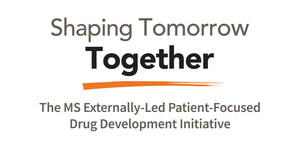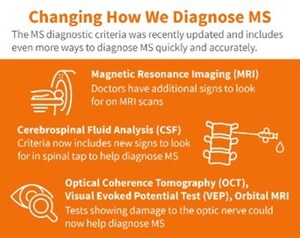
Part 1: Overview, Progress Toward Stopping MS
NEW YORK, Dec. 26, 2012 /PRNewswire-USNewswire/ -- MS research continued to advance on many fronts in 2012. This year saw:
(Logo: http://photos.prnewswire.com/prnh/20090302/DC77093LOGO)
- The approval of a second oral therapy for relapsing forms of MS and other emerging treatments progressing through the development pipeline;
- The launch of the International Progressive MS Collaborative, the largest effort to date to speed research to stop progressive forms of MS;
- The discovery of what could be a target of the immune attack in people with MS may lead to new understanding of the disease and new treatment strategies;
- The completion of the first human trial of an experimental therapy targeting myelin repair;
- Progress in restoring functions using innovative rehabilitation techniques, including memory enhancement using a technique involving stories and imagery to solidify learning, and improving balance and mobility with specific exercises;and
- Advances in uncovering MS triggering factors, bringing us closer to finding ways to prevent the disease; and many other advances pushing us closer to a world free of MS.
The National MS Society continues to propel research forward with a comprehensive strategy aimed at stopping MS, restoring function and ending MS forever (http://www.nationalmssociety.org/research/index.aspx):
- This year we invested $44 million in over 350 new and ongoing projects;
- Projects include everything from discovery research to the Society's drug development efforts through Fast Forward® (www.fastforward.org).
- Read about recently launched research. (http://www.nationalmssociety.org/research/about-our-research-programs/download.aspx?id=44468)
In the world's largest meeting dedicated to MS research, over 7,000 scientists convened in Lyon, France to present findings at ECTRIMS (European Committee for Treatment and Research in MS). Over 1250 studies covering virtually every aspect of research were presented:
- Read a summary http://www.nationalmssociety.org/news/news-detail/index.aspx?nid=7052 and blogs http://blog.nationalmssociety.org/search/label/ECTRIMS
View videos on specific ECTRIMS topics http://www.youtube.com/playlist?list=PLnPWMdCPZiBbT4OEEunsWbzFTkWNoguQD&feature=addto
PROGRESS TOWARD STOPPING MS
The Society continued to invest in research to stop MS, including:
- Funding of clinical trials:
- Testing whether vitamin D, or the sex hormone estriol, or the probiotic approach of a sports drink containing parasite eggs, can reduce MS immune attacks
- Determining if treatments available for other disorders, such as riluzole (a treatment for ALS or Lou Gehrig's disease) or phenytoin (a treatment for epilepsy), or the antioxidants lipoic acid or green tea extract, can protect the nervous system from damage.
- Supporting a syndicate formed in the United Kingdom to conduct innovative clinical trials of neuroprotective drugs in secondary-progressive MS.
- New projects focusing on discovering "biomarkers" to aid better diagnosis and treatment decisions;
- Collaboration in a cross-disease drug screening initiative aimed at discovering the potential of compounds to stop nerve degeneration and protect the brain from harm;
- In partnership with Merck Serono, Fast Forward provided funding for lab research to discover small molecules that can deliver therapies to areas of nervous system damage and protect against that damage in MS.
Other important 2012 results toward stopping MS include:
Treatment Pipeline
FDA Approves Oral Aubagio® (Teriflunomide, Genzyme, a Sanofi company)– The once-daily pill was approved as a disease-modifying therapy for relapsing forms of MS. Aubagio is the second oral disease-modifying therapy approved for the treatment of MS, and it became available for prescription in October 2012 in the U.S. http://www.nationalmssociety.org/news/news-detail/index.aspx?nid=6864
Two potential therapies are before FDA –
- Biogen Idec applied to the FDA for approval of BG-12 to treat relapsing MS. This oral therapy showed benefits against relapses and other MS activity in recent trials. The FDA review is underway (http://www.nationalmssociety.org/news/news-detail/index.aspx?nid=6015).
- Genzyme applied for approval of alemtuzumab to treat relapsing MS, based on positive results from several clinical trials. It is given by a cycle of IV infusions once per year. The FDA asked the company to resubmit its application. http://nationalmssociety.org/news/news-detail/index.aspx?nid=6496
Tysabri® label updated to include lab test to enhance treatment decisions – The test detects antibodies to the JC virus and can help determine a person's risk of developing PML, a severe brain infection that has emerged in some people who have taken Tysabri (natalizumab, Biogen Idec and Elan). The test should enhance the ability of people with MS to weigh risks and benefits of this therapy. http://www.nationalmssociety.org/news/news-detail/index.aspx?nid=5887
Clinical trials discussed at ECTRIMS 2012 – Positive results from trials of statins (cholesterol-reducing medication) and Tysabri in progressive forms of MS, a new approach called AIN457 for treating relapsing MS, and results from phase II and III clinical trials of therapies were among results presented at ECTRIMS focusing on stopping MS. http://www.nationalmssociety.org/news/news-detail/index.aspx?nid=7052
Phase II results of ocrelizumab in relapsing MS – Experimental ocrelizumab (Genentech), given intravenously, significantly reduced disease activity on MRI scans in a study of 218 people with relapsing-remitting MS. One person died due to brain edema; the relation of this death to the medication is unclear. Additional research, now going on in primary-progressive MS and relapsing-remitting MS, is needed to further determine this therapy's safety and benefits. http://www.nationalmssociety.org/research/research-news/news-detail/index.aspx?nid=5659
Another step toward personalized medicine in MS – Harvard researchers discovered that differences in active genes that are detectable in blood samples may be used to group people with MS into categories that predict disease course and response to therapy. Further research is needed, but it represents an early step toward personalized medicine in MS. http://www.nationalmssociety.org/news/news-detail/index.aspx?nid=6941
New approach to stopping MS – Researchers at Northwestern University have developed an innovative strategy for selectively inhibiting the immune attack in MS using tiny "nanoparticles" that were able to reduce disease activity in mice. The team is now planning a phase I clinical trial of this new technology. http://www.nationalmssociety.org/news/news-detail/index.aspx?nid=7126
Understanding MS
Possible target of immune attacks in some people with MS identified – An immune response to a protein – called "KIR4.1," which is found on several types of brain cells – was observed in the serum of 47% of people with MS. Further research is needed to confirm and understand these findings, which were the result co-funding by the National MS Society. http://nationalmssociety.org/news/news-detail/index.aspx?nid=6619
MS Societies worldwide collaborate to stop MS progression – The newly formed International Progressive MS Collaborative published a paper outlining challenges and identifying key research priorities to propel efforts to stop MS progression. http://www.nationalmssociety.org/news/news-detail/index.aspx?nid=6847
Stress management reduces MS activity – A 24-week stress management program reduced disease activity on MRI scans significantly more than in a control group, in a study at Northwestern University involving 121 people with relapsing MS. However, the benefits appeared to disappear after the weekly in-person stress management sessions were completed. Future studies should provide more clarity for optimizing the potential benefits of stress management. http://www.nationalmssociety.org/news/news-detail/index.aspx?nid=6629
Society launches project to change how MS disability and progression are measured – This cross-sector collaboration has the goal of developing new or improved tools that will be able to track benefits of therapies more quickly in people so that new therapies to stop MS progression may be tested using better assessment tools that are accepted by drug regulatory agencies. http://nationalmssociety.org/news/news-detail/index.aspx?nid=6777
Researchers co-funded by the National MS Society discover possible mechanism for MS damage to nerve tissue – The University of California, San Francisco researchers found that a blood-clotting protein called fibrinogen may play an early role in triggering inflammation that damages nerve fibers in a mouse model of MS. This points to a role for fibrinogen in stimulating inflammation by cells called microglia. If confirmed, targeting the interaction of fibrinogen and microglia may prove to be a novel strategy for stopping MS damage in its tracks. http://www.nationalmssociety.org/news/news-detail/index.aspx?nid=7157
Save this date January 30, 2013, 2:00 – 3:00 p.m. ET and sign up for the live webcast, "From the Frontlines: New Avenues In MS Research for 2013." Visit the National MS Society website.
About Multiple Sclerosis
Multiple sclerosis, an unpredictable, often disabling disease of the central nervous system, interrupts the flow of information within the brain, and between the brain and body. Symptoms range from numbness and tingling to blindness and paralysis. The progress, severity and specific symptoms of MS in any one person cannot yet be predicted, but advances in research and treatment are moving us closer to a world free of MS. Most people with MS are diagnosed between the ages of 20 and 50, with at least two to three times more women than men being diagnosed with the disease. MS affects more than 400,000 people in the U.S. and over 2.1 million worldwide.
About the National Multiple Sclerosis Society
The National MS Society addresses the challenges of each person affected by MS. To fulfill this mission, the Society funds cutting-edge research, drives change through advocacy, facilitates professional education, collaborates with MS organizations around the world, and provides programs and services designed to help people with MS and their families move forward with their lives. In 2011 alone, through its national office and 50-state network of chapters, the Society devoted $164 million to programs and services that assisted more than one million people. To move us closer to a world free of MS, the Society also invested $40 million to support more than 325 new and ongoing research projects around the world. The Society is dedicated to achieving a world free of MS. Join the movement at www.nationalMSsociety.org.
SOURCE National Multiple Sclerosis Society







Share this article